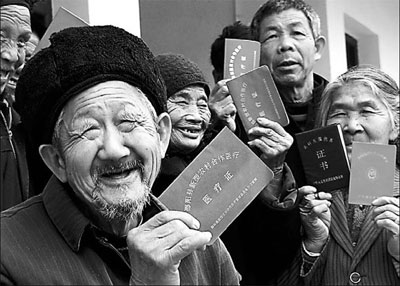Residents of a retirement home in Shaoyang county, Hunan Province, hold up their newly issued healthcare insurance cards on Monday. The local government decided to extend a nationwide health insurance scheme for farmers to include retirees.
A pilot version of the long-awaited medical reform plan will be set up in "selected regions" this year, paving the way for healthcare "with Chinese characteristics", the Ministry of Health announced at its annual national conference yesterday.
"The major task this year is to launch pilot versions of key programs listed in the newly outlined medical reform plan in selected regions to accumulate experiences before nationwide implementation," Minister of Health Chen Zhu said.
He did not explain how the regions will be selected or how many will take part in the pilot scheme.
Chen outlined the reform plan, which aims to provide universal basic services at reasonable prices, in a report to the Standing Committee of the National People's Congress (NPC) last month.
Vice-minister of health Gao Qiang said at the gathering yesterday that the development of the country's healthcare system will "follow a path with Chinese characteristics".
"Imitating foreign models blindly in medical reforms will only lead to mistakes," he said.
The scheme's basic concepts include a people-first orientation, maintaining the nonprofit nature of public medical institutions, reducing hospitals' involvement in drug sales, increasing government responsibility and establishing a basic medicare network for the whole population.
However, the new plan failed to impress some officials present at the meeting yesterday.
Liao Xinbo, vice-director of Guangdong's health department, said the new plan is "not very exciting" and not feasible.
He said the call to increase the government's obligations and input is the most exciting part of the scheme, although coordinated and detailed plans are needed to make it work.
The plan explains its call for hospitals to gradually reduce their involvement in drug sales by saying that any loss in revenue could be offset by government subsidies and "a reasonable rise in medical service fees".
Many citizens have expressed concern over the latter provision, fearing larger fees will render the promised cost savings moot.
A netizen going by the alias Tiandadida on a forum on Sina.com.cn wrote: "I'm afraid that drug prices may not go down, but medical service fees will surely shoot up."
Medical reform began in 1992 to replace a system under which the government covered more than 90 percent of people's expenses.
However, soaring medical costs have kept many people mired in poverty. There are about 400 million people around the country without any healthcare coverage, according to the Ministry of Health.
(Xinhua News Agency January 10, 2008)


